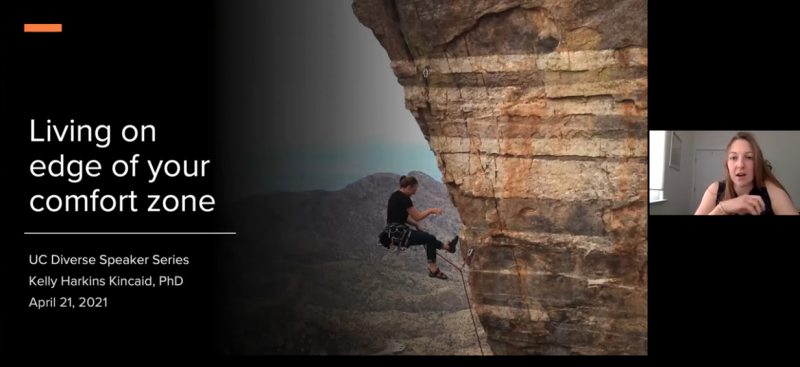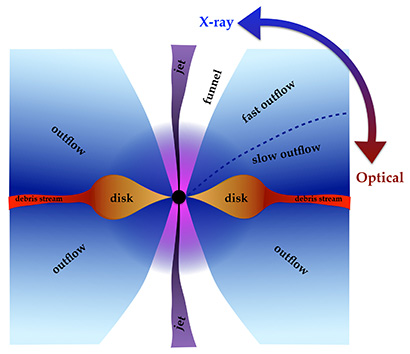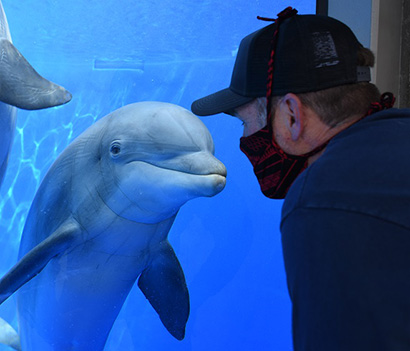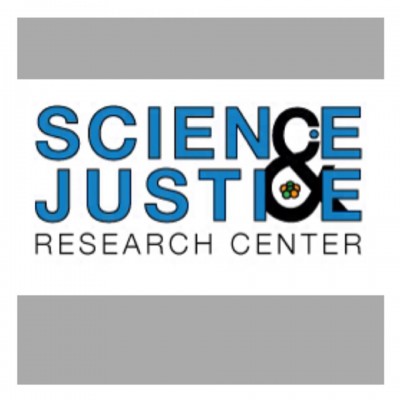Events
Kelly Harkins Kincaid: From orchestra pit to executive leadership

By Melissa Weckerle
Baskin School of Engineering
April 27, 2021 — Santa Cruz, CA
(Photo above: Kelly Harkins Kincaid presenting her talk, “Living on the Edge of Your Comfort Zone: Women in Executive Leadership.” Source: Baskin Engineering.)
Kelly Harkins Kincaid, CEO of Claret Bioscience and Astrea Forensics, was the second speaker of Diverse Voices: Season 3. The Diverse Voices speaker series, featuring industry leaders and Baskin Engineering alumni, aims to promote diversity in engineering and tech and inspire more individuals from underrepresented backgrounds to pursue STEM education and careers.
Kincaid’s talk, “Living on the Edge of Your Comfort Zone: Women in Executive Leadership,” focused on the idea that when you learn to step outside of your comfort zone, you find endless possibilities for personal and professional growth.
“You gain new knowledge, hidden potential, confidence, and reward,” said Kincaid.
The concept of stepping outside of one’s comfort zone didn’t fully resonate with Kincaid until after she received her undergraduate degree. Once she began exploring new fields of study, participating in internships and volunteer work, and connecting with people outside of her network, her graduate academic and professional career took off.
Exiting the comfort zone
Kincaid grew up playing music, and although she was very talented, she felt more comfortable in the pit orchestra rather than as a solo pianist in the spotlight.
“Being behind the scenes was my comfort zone,” Kincaid stated.
And all through high school, Kincaid believed she was bad at math and science and was scared of failing in college, so she chose an undergraduate degree program within her comfort zone that would also prevent her from having to take math and complex science courses.
As an introvert, Kincaid relished being in her comfort zone and rarely left it. But, after graduating from Skidmore College with a B.A. in music and archaeology, Kincaid acknowledged that she would need to exit her comfort zone to reach her fullest potential.
She applied to internships and participated in volunteer work, and then was hired as an archaeologist. She was able to advance this career trajectory further when she was awarded a Fulbright Fellowship with the Natural History Museum of Vienna.
Kincaid recalled, “When I got to the museum, for the first part of that year, I had no idea what I was doing. And for some reason at that age with a bachelor’s degree, I thought I had to have it all figured out.”
“It took a while for me to ask for help but eventually I did and the museum curator became a mentor to me.”
After being in the field for a while, Kincaid was interested in pursuing graduate education in bioarchaeology. She went to Arizona State University (ASU) and earned M.A. and Ph.D. degrees in anthropology with a specialization in bioarchaeology. While at ASU, she was mentored by Jane Buiktra, a leader in the field.
Through her work with Buiktra, Kincaid became interested in molecular anthropology.
“The field of ancient DNA was lighting up in 2008, and the huge strides that were being made in genomics and next-generation sequencing were just starting to trickle down to molecular anthropology,” Kincaid said.
“I remember thinking ‘This is where the future is and that’s what I’m going to do, but how am I going to get there?’”
Not having the science background meant Kincaid was going to have to work extra hard by taking classes in the sciences and training in a variety of labs in order to land opportunities in this field.
“It was a super steep learning curve,” Kincaid said.
The leap from academia to executive leadership
Kincaid traveled from Arizona to UC Santa Cruz for her postdoctoral studies, where she worked in the Human Paleogenomics Lab with Professor Fehren-Schmitz. Wanting to get funding on her own, she applied to become an NSF Postdoc Fellow and began working with Baskin Engineering Associate Professor Ed Green.
Green, noticing that the DNA methods Kincaid was developing in the lab were applicable to the clinical field, saw a great opportunity for Kincaid.
“His entrepreneurial mind went to ‘We should start a company; do you want to run it?’” said Kincaid.
Having no experience in running a business and being on track to become a university faculty member, Kincaid knew this was going to be one of the biggest decisions of her life. She ended up saying yes and quickly made the transition from academia to industry to become the CEO of the Santa Cruz biotech company Claret Bioscience.
“I never thought of myself as an entrepreneur or someone who would become an executive decision maker. Being out of my element was an understatement,” Kincaid said.
The best advice given to Kincaid when she was struggling with the initial transition was ‘You need to evolve.’
And with that, Kincaid was pushed to pivot quickly, taking on the vast responsibilities required to establish and lead a company. She eventually got the hang of it, she said, and founded Astrea Forensics, a biotech startup that works closely with law enforcement to solve cold cases using recovered DNA.
As a woman in leadership
Kincaid mentioned that only 14% of startup CEOs are women.
“It’s scary to leave the path you’ve known and trained for all your life,” said Kincaid.
Being outnumbered is an everyday reality that she faces. It’s intimidating for Kincaid, but she strongly believes in pushing through that discomfort and speaking up when you have ideas to share or feedback to give. “Your ideas are just as valid as anyone else’s,” she explained.
Recognizing the lack of diversity not only in executive teams but across industry, Kincaid adopted a leadership style that prioritizes efforts to bridge the gap for underrepresented groups in engineering and technology. As CEO, she pursues fair hiring practices that encourage diverse applicant pools and promotes a diverse and inclusive work environment.
Her final advice of the night for listeners was this: When faced with uncomfortable situations and feelings of self-doubt and inadequacy, keep that flame of confidence alive that says, ‘I’m going to show you, and don’t underestimate me.’
To access the recording of this event and to find more information about the series, visit the Diverse Voices 2021 website. Tune in for the next event, “Retaining Women in Tech: The Skills Needed by Women to Help Face the Challenges of Staying and Thriving in the Tech Industry,” featuring Jossie Haines on Tuesday, May 11 at 5 p.m.
###
Originally published here: https://www.soe.ucsc.edu/news/kelly-harkins-kincaid-pit-orchestra-to-executive-leadership
###
Tagged Astrea Forensics, Baskin School of Engineering, Claret Bioscience, Kelly Harkin Kincaid, UC Santa Cruz








